SIG 20 & 26 Conference 2024
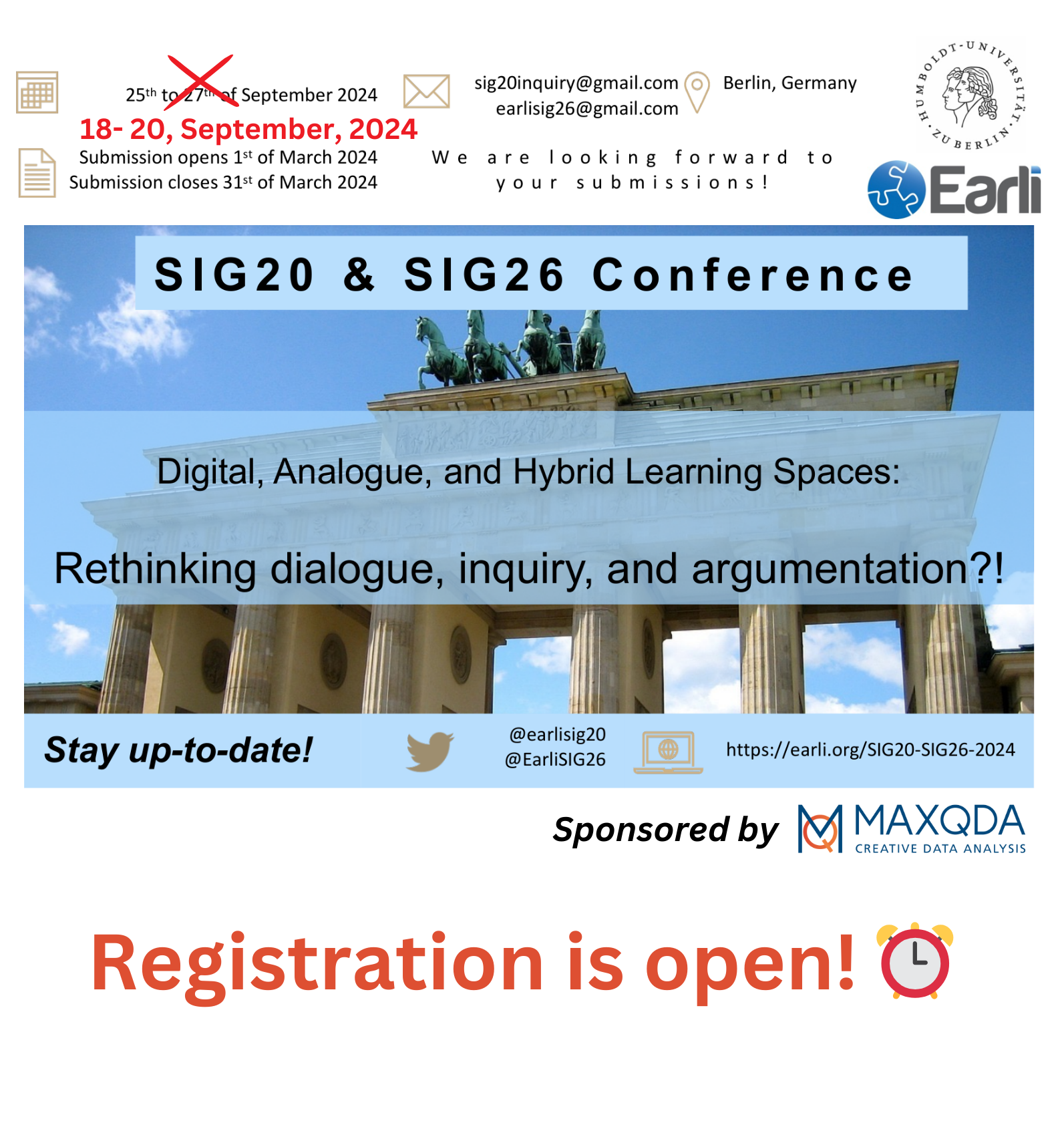

Registration for the Joint SIG 20 & 26 Conference is now open!
You can register for the conference following the link: https://hi.converia.de/frontend/index.php?sub=119
The dinner is included in the conference fee, there is no need to book it separately. Payment options: credit card, PayPal, invoice.
For more information on how to register, you please review our guide.
Important: If you choose to register as an EARLI/JURE member, you need to upload a confirmation.
KEY DATES:
Early Bird Deadline: June 20th, 2024
Registration Deadline for presenters: August 16th, 2024
Registration Deadline: September 6th, 2024
FEES:
EARLI member Early Bird | 300,00 € |
EARLI member Regular | 375,00 € |
JURE member Early Bird | 200,00 € |
JURE member Regular | 250,00 € |
Non-members Early Bird | 375,00 € |
Non-members Regular | 470,00 € |
EARLI/JURE MEMBERSHIP:
You will need to upload a confirmation of your EARLI/JURE member status. The confirmation can be downloaded from your EARLI account. If we cannot verify your member status, you will need to pay the non-member fees.
Instructions on how to that that via your EARLI dashboard are provided here.
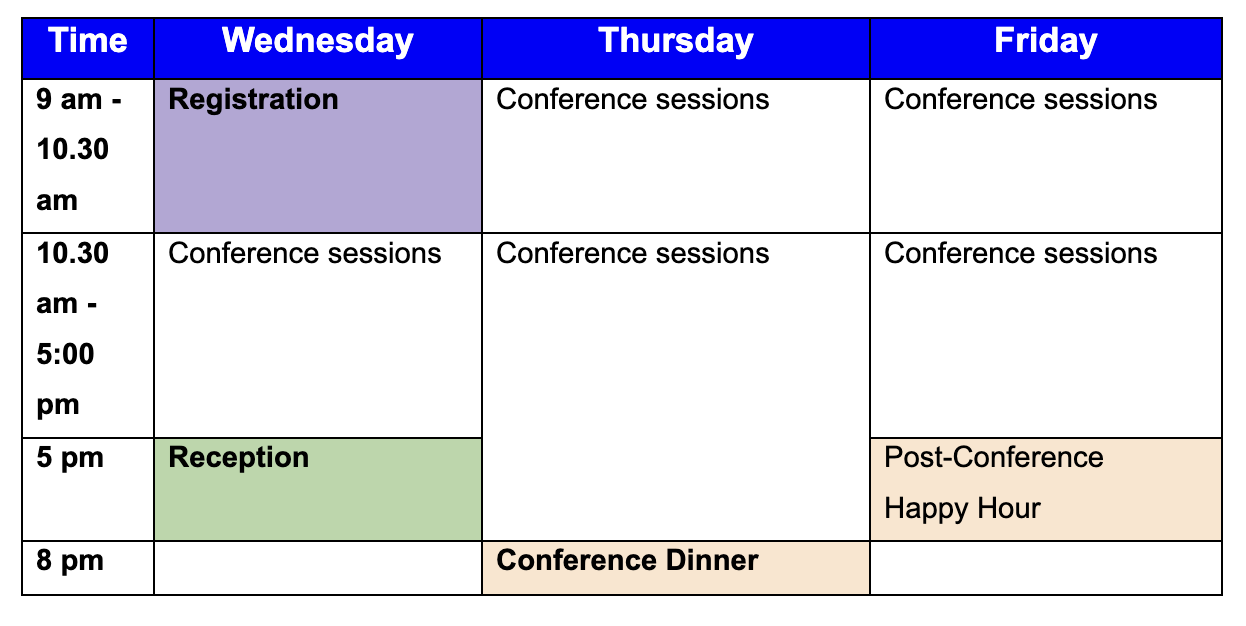
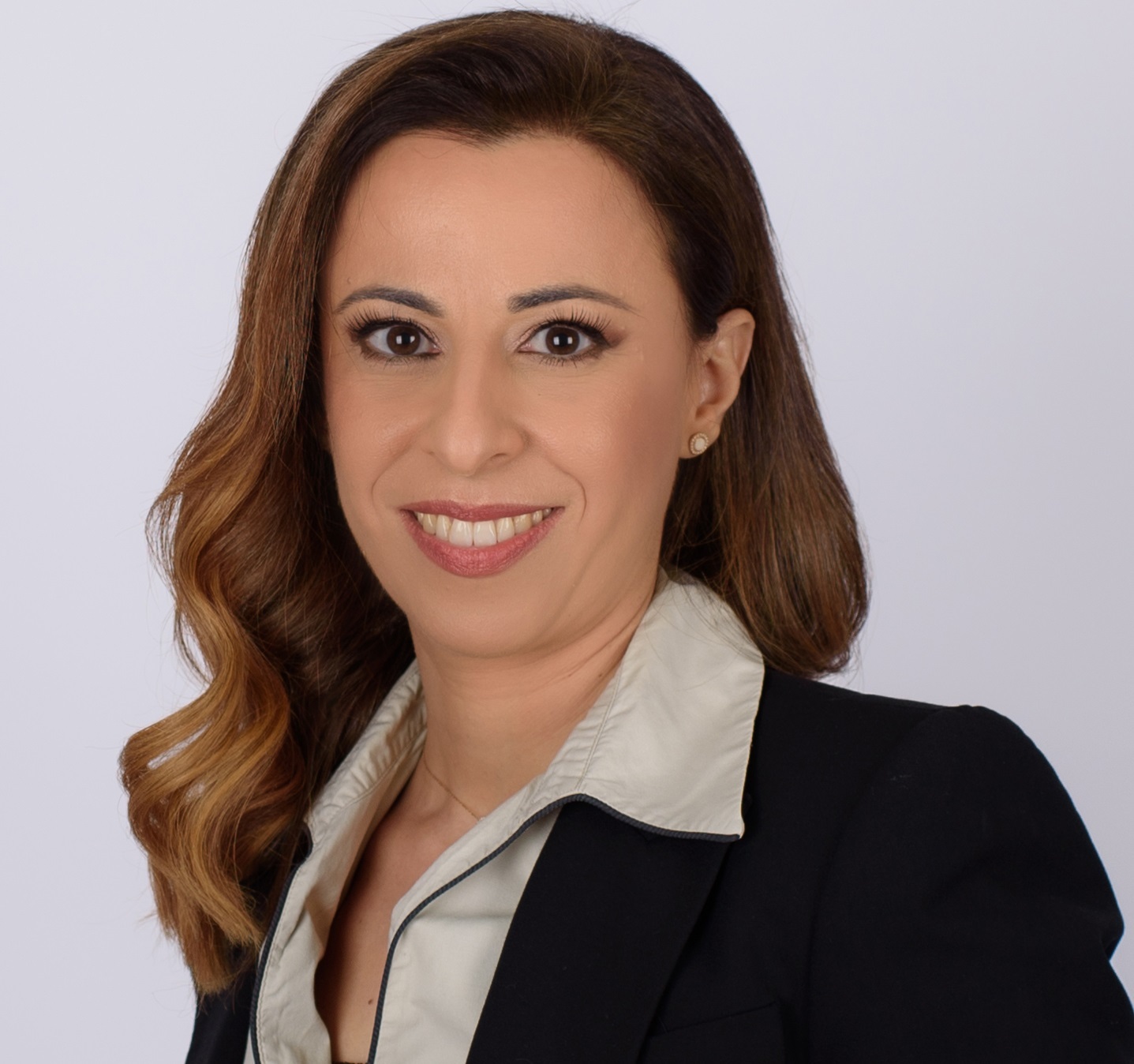
Kalypso Iordanou is a Professor of Psychology at the University of Central Lancashire (UCLan), Cyprus. She received her PhD in Educational Psychology from Columbia University in New York, after receiving a Fulbright scholarship. Her work focuses on argument skills, epistemic cognition, reasoning in online engagement, and using technology to promote thinking-skills and learning. Her work has been supported by several research bodies including the European Commission and the Research and Innovation Foundation (RIF). Some of the projects she has been working on are the design of interventions for supporting students’ argumentation skills and reducing prejudice (ARE-PRED, Excellence Hubs-RIF), ethical issues of AI and Big Data that challenges democracy (SHERPA, Horizon 2020), trust in science (VERITY, Horizon-Europe), and extremist reasoning in social media (SMIDGE, Horizon-Europe). Her research achievements have been honored by awards from several bodies, such as the Fulbright Commission – supporting a Visiting Fellowship at Columbia University (US) in 2017- and the Research and Innovation Foundation, awarding her the National Young Researcher Award.
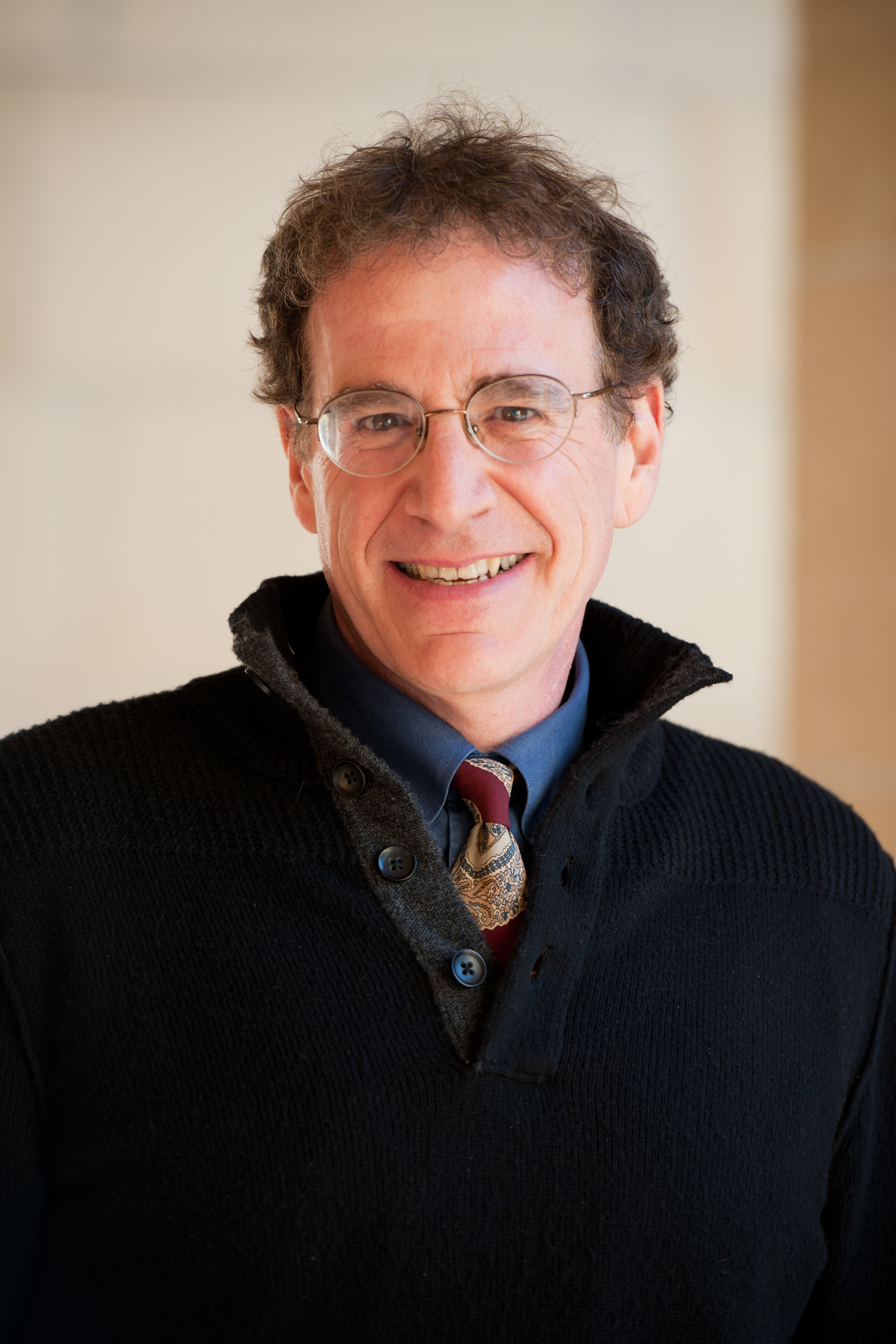
Sam Wineburg (samwineburg.com) is the Margaret Jacks Professor of Education, Emeritus, and, by courtesy, of History & American Studies at Stanford University. Educated at Brown University and UC/Berkeley, he holds a doctorate in Psychological Studies in Education from Stanford and an honorary doctorate from Sweden’s Umeå University. In 2004, Wineburg founded the Stanford History Education Group, a curriculum development effort that has grown into the largest provider of free curriculum in the social studies, with over 17 million downloads of its curriculum and assessments. Since 2016 his research has focused on “Civic Online Reasoning,” or how people judge the credibility of information on the Internet— research that has been featured in TIME Magazine, the Wall Street Journal, NPR, and on multiple occasions in the New York Times. In 2021, UNESCO honored him with its International Media Literacy Award. In 2024, Wineburg retired from Stanford to co-found the Digital Inquiry Group, a nonprofit organization that provides free resources to schools and universities
Wineburg’s interdisciplinary scholarship has appeared in outlets as diverse as Cognitive Science and the Journal of American History. His public scholarship has appeared in places like the New York Times, USAToday, Washington Post, Los Angeles Times, Slate, and the Smithsonian Magazine. His 2002 book, Historical Thinking and Other Unnatural Acts: Charting the Future of Teaching the Past won the Frederic W. Ness Award from the Association of American Colleges and Universities for work that makes the most important contribution to the “improvement of Liberal Education and understanding the Liberal Arts.” His latest book, with co-author Mike Caulfield, is entitled Verified: How to Think Straight, Get Duped Less, and Make Better Decisions about What to Believe Online (Chicago, 2023).

Dr. John Nesbit is a professor of educational psychology and educational technology & learning design at Simon Fraser University, Canada. Through meta-analyses and primary studies, his research group investigates fundamental and applied topics in the learning sciences. After a PhD program that investigated application of machine learning to instructional design (University of Alberta, 1988), he spent 5 years as a visiting scholar and faculty member at Tsukuba University and Seishin University in Japan. Since joining Simon Fraser University, he has collaborated with colleagues to publish research on evaluation of digital learning resources, concept mapping, multimedia learning, self-regulated learning, self-explanation, and intelligent tutoring systems. In recent years, his research group has focused on two topics relevant to the EARLI SIG 20 & 26 Conference: Tutor guidance in simulation-based inquiry learning and argument visualization in postsecondary courses. The research on guidance in inquiry learning starts with the general premise, now widely accepted, that interactive, scaffolded assistance during inquiry tasks is beneficial and investigates which types of guidance (and which triggering conditions for that guidance) are most effective. This research has collected, and is engaged in analysing, over 230 hours of video in which human tutors follow instructional heuristics and/or scripts to guide learners interacting with a scientific simulation. The research on argument visualization has developed, deployed, and evaluated a web-based argument mapping tool (DMap) for scaffolding student argumentation in university courses across a wide range of disciplines.
March 1st, 2024
April 10, 2024
May 23, 2024
May 25, 2024
June 20th, 2024
August 16, 2024
September 6th, 2023
September 18th to 20th, 2024
Leonardo Hotel Berlin Mitte (800m from Conference venue)
H Hotel Berlin Mitte (1.6 km from Conference venue)
Aquino Hotel (1.6 km from Conference venue)
Motel One Berlin Alexanderplatz (1.7 km from Conference venue)
Motel One Berlin Hackescher Markt (1.3 km from Conference venue)
Motel One Berlin Hauptbahnhof (2.4 km from Conference venue)
Park Inn Berlin Alexanderplatz (1.5 km from Conference venue)
Intercity Hotel Berlin Hauptbahnhof (2.1 km from Conference venue)
Steigenberger am Kanzleramt (2.1 km from Conference venue)
Booking accommodation via Airbnb is also an option. With public transport, you can easily reach the conference venue from other parts of the city. Google Maps can help estimate the distance from your accommodation to the venue and suggests various modes of transport.
Transportation
There are many ways to get around Berlin:
Public Transport (S-Bahn, Tram, U-Bahn, Bus): Book tickets via the BVG App (4 single rides: https://www.bvg.de/en/subscriptions-and-tickets/all-tickets/single-tickets/4-trip-ticket; 24h ticket: https://www.bvg.de/en/subscriptions-and-tickets/all-tickets/24h-tickets/24h-ticket) and use Google Maps or the BVG App (https://www.bvg.de/en/subscriptions-and-tickets/all-apps/fahrinfo-app) or Deutsche Bahn App (https://www.bahn.de/service/mobile/db-navigator) to plan your journey.
Taxis: You can also order an Uber, Bolt, or FreeNow to get you from A to B.
E-Scooters, Bikes etc.: There are several providers with which you can rent bikes, scooters, and more (see https://www.berlin.de/en/getting-around/).
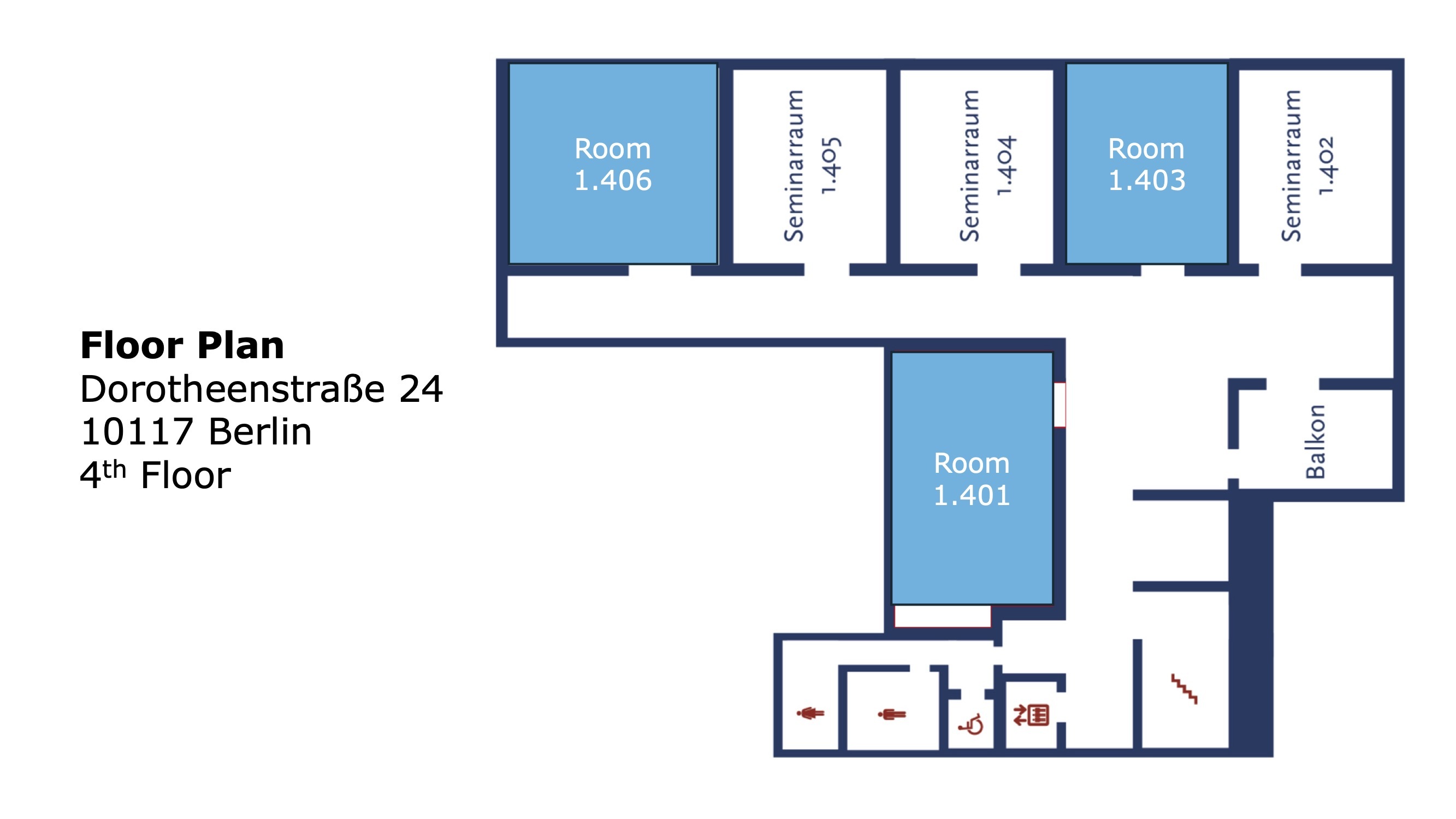
Humboldt-Universität zu Berlin
Humboldt-Universität zu Berlin, founded in 1810, is the oldest university in Berlin and one of the most renowned universities in the world. Today, the HU's teaching and research programmes cover all fundamental scientific disciplines in the humanities, social and cultural sciences, law, life sciences, mathematics and natural sciences, medicine, agricultural sciences and sustainability and antiquity research.
More than 37,000 young people from over 100 countries are currently studying at Humboldt-Universität in 171 Bachelor's and Master's degree programmes under the supervision of around 420 professors. Around 34 per cent of academic staff come from other countries.
Thanks to numerous cutting-edge research projects and renowned international networks, Humboldt-Universität is one of the most important universities in the German-speaking world. In the 2019 Excellence Strategy, it was recognised as an Excellence Network together with the partners of the Berlin University Alliance. It had previously been one of the eleven German Universities of Excellence since 2012.
The HU combines research excellence with innovative support for young researchers. The focus of teaching is on research-based learning, interdisciplinarity and internationalisation.
Location/Rooms:
Dorotheenstraße 24, 10117 Berlin (https://maps.app.goo.gl/BrEj5F...): DOR24: 1.401, 1.403, 1.406
The SIG 20 scientific committee consists of:
Antti Lehtinen (University of Jyväskylä, Finland)
Ard Lazonder (Radboud University in Nijmegen, The Netherlands)
Bram De Wever (Ghent University, Belgium)
Christiana Varda (UCLan Cyprus)
Cindy Hmelo-Silver (Indiana University, USA)
Eleni Kyza (Cyprus University of Technology, Cyprus)
Hannie Gijlers (University of Twente, Netherlands)
Ingo Kollar (University of Augsburg)
Janice Gobert (Rutgers University)
Koen Veermans (University of Turku, Finland)
Margus Pedaste (University of Tartu, Estonia)
Tasos Hovardas ( University of Cyprus, Cyprus)
Tomi Jaakkola (Tampere University, Finland)
Wouter van Joolingen (Utrecht University, Netherlands)
Yiannis Georgiou (Cyprus University of Technology)
The SIG 26 scientific committee consists of:
Adam Lefstein (Hebrew University of Jerusalem, Israel)
Alexander Gröschner (University of Jena, Germany)
Alina Reznitskaya (Montclair University, USA)
Antonia Larrain (Alberto Hurtado University, Chile)
Armin Weinberger (University of Saarland, Germany)
Baruch Schwarz (Hebrew University of Jerusalem, Israel)
Benzi Slakmon (Tel Aviv University, Israel)
Carla van Boxtel (University of Amsterdam, Netherlands)
Chiel van der Veen (Vrije Universiteit Amsterdam, Netherlands)
Christine Howe (Cambridge University, UK)
Chrysi Rapanta (NOVA university Lisbon, Portugal)
Claire Polo (Lyon 2 University, France)
Clark Chinn (Rutgers University, USA)
Edith Bouton (Hebrew University of Jerusalem)
Elisa Calcagni (Pontificia Universidad Católica de Chile)
Gaowei Chen (University of Hong Kong)
Ian Wilkinson (Ohio State University, USA)
Klara Sedova (Masaryk University, Czech Republic)
Kristine Lund (Lyon 2 University, France)
Maria Evagorou (University of Nicosia, Cyprus)
Maria Vrikki (University of Cyprus)
Maureen Boyd (University of Buffalo, USA)
Michael Baker (CNRS, France)
Michael Nussbaum (University of Nevada, USA)
Ricardo Böheim (Technical University of Munich)
Riikka Hofmann (University of Cambridge, UK)
Roman Švaříček (Masaryk University, Czech Republic)
Rupert Wegerif (University of Cambridge, UK)
Sherice Clarke (University of California San Diego, USA)
Sara Hennessy (University of Cambridge, UK)
Ingvill Rasmussen (University of Oslo, Norway)
The Local Organizing Committee:
Elisabeth Mayweg-Paus & Theresa Ruwe.
The SIG 20 Organizing Committee consists of:
● Tasos Hovardas (SIG Coordinator)
● Tomi Jaakkola (SIG Coordinator)
● Christiana Varda (JURE Coordinator)
The SIG 26 Organizing Committee consists of:
● Christa Asterhan (SIG Coordinator)
● Freydis Vogel (SIG Coordinator)
● Lydia Cao (JURE Coordinator)
Contact the organizing committees at sig20inquiry@gmail.com and earlisig26@gmail.com.
More information
For more information regarding the joint SIG 20 and SIG 26 conference “Digital, analogue, hybrid learning spaces: Rethinking dialogue, inquiry, and argumentation?!” in Berlin, Germany, on 18-20 September 2024, please visit the conference website https://earli.org/SIG20-SIG26-2024.
We are very much looking forward to meeting you all in Berlin next September!
(For more information about Berlin, see https://www.visitberlin.de/en)